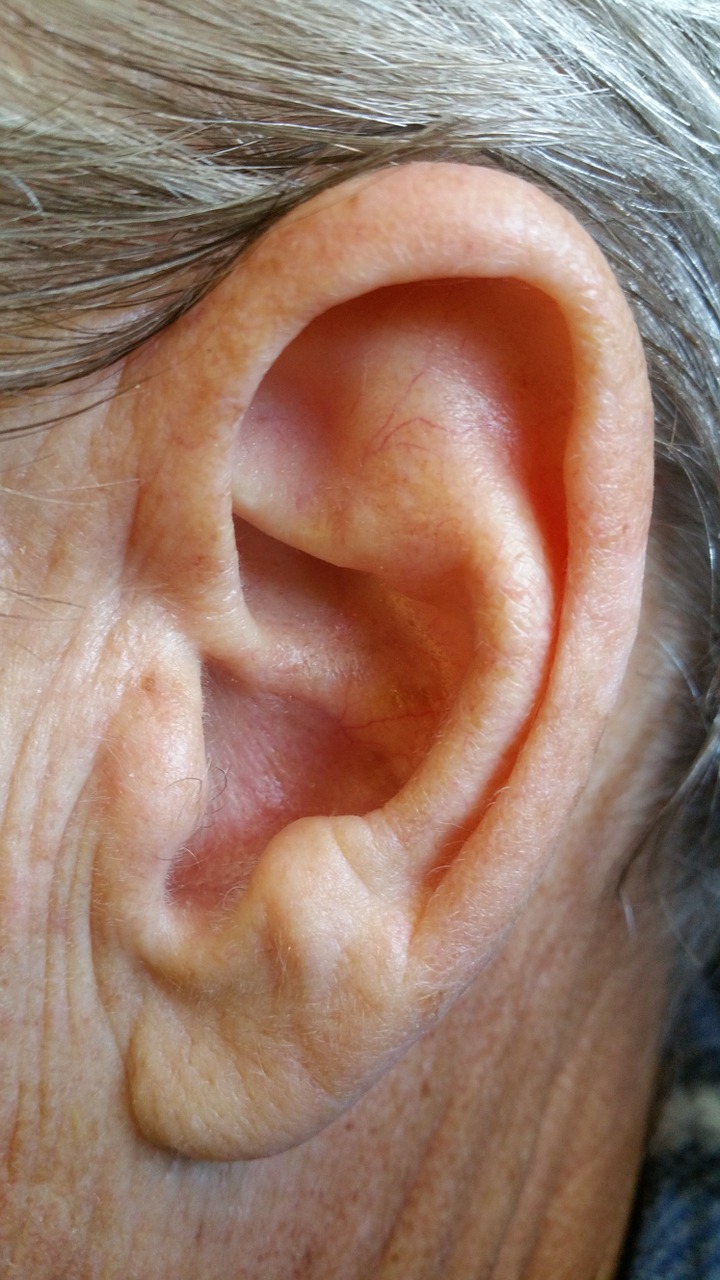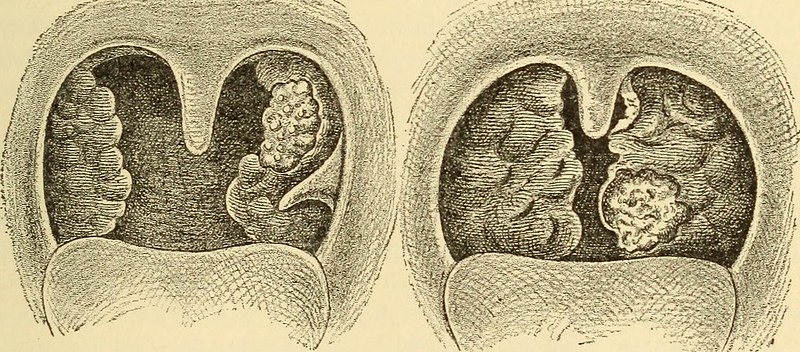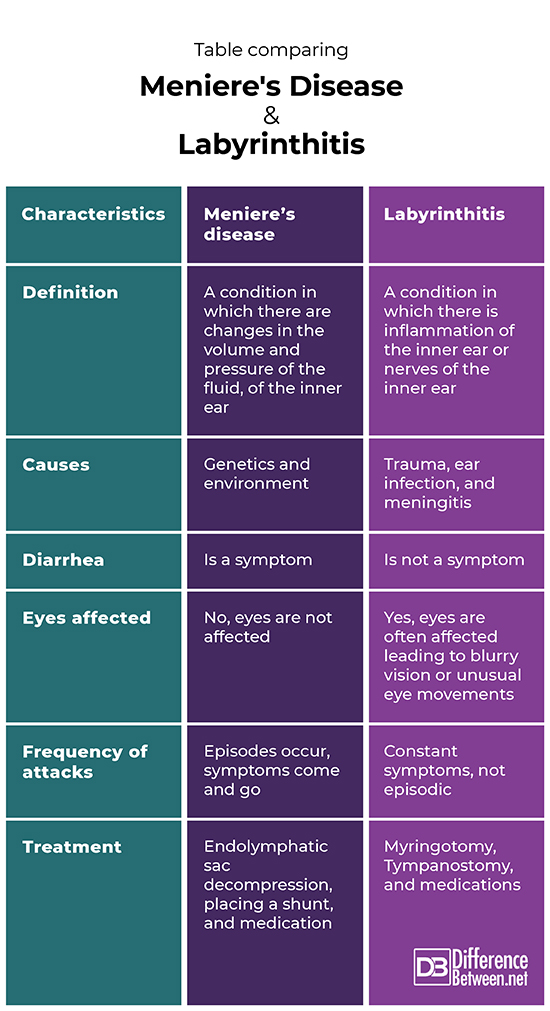Difference Between Meniere’s Disease and Labyrinthitis
Meniere’s disease is a problem where there are aberrant changes in the volume and pressure of the fluid of the inner ear. Labyrinthitis is a problem where there is an inflammation of the inner ear or nerves of the region.

What is Meniere’s Disease?
Definition:
A condition in which there are unpleasant changes in the volume and pressure of the fluid of the inner ear.
Symptoms:
Dizziness and the sensation that you are moving, along with nausea and vomiting are the major symptoms of the condition. The symptoms can last for a couple of hours; symptoms come and go in episodes or attacks of dizziness. People may also have a ringing noise in the ear and sweat profusely. Patients with Meniere’s disease also sometimes have diarrhea when they are ill with this condition, and they are always unsteady on their feet. There is often hearing loss and the ear may feel full when a person is having an attack.
Diagnosis:
The condition is most often diagnosed in young or middle-aged adults. Diagnosis is based on the patient having had vertigo at least twice that lasted from between about 20 minutes to a couple of hours, but not longer than about 12 hours. The presence of ringing in the ears and hearing loss also lend credence to a diagnosis of Meniere’s disease.
Causes and complications:
There are several possible causes of Meniere’s disease, including trauma, infections like syphilis, and genetic factors. It is thought that it is often a combination of both genetics and environmental factors that probably cause the condition. An abnormal immune response is also thought by some doctors to be a cause of the illness. Complications include the disruption to one’s life, the increased chance of accidents and falls and possibly, permanent loss of hearing.
Treatment:
Medications can help with the symptoms. Commonly, people take anti-nausea medicine such as promethazine and also medicine for motion sickness such as meclizine. There is no cure for the condition but if medication does not work there are some surgical options that may help. The placement of a shunt into the ear and endolymphatic sac decompression can help relieve the buildup of fluid in the inner ear.

What is Labyrinthitis?
Definition:
Labyrinthitis is an inflammatory condition affecting the inner part of the ear or the nerves in this region of the ear and is often because of a bacterial or viral infection.
Symptoms:
The symptoms of labyrinthitis include fever, pain in the ear, extreme dizziness, odd eye movements that tend to recur, and problems in focusing the eyes. People with labyrinthitis also commonly experience vomiting, nausea, and ringing in the ears. There can be some hearing loss if the cause is an ear infection. The symptoms tend to persist when a person has labyrinthitis, they do not come and go.
Diagnosis:
Besides noting the symptoms, certain imaging methods can also help with diagnosis particularly if meningitis is suspected. CT scans and MRI scans can sometimes be helpful in diagnosis of labyrinthitis.
Causes and complications:
Labyrinthitis is often a complication of a severe bacterial ear infection such as otis media, and can be due to meningeal infections. Causes can also include an unusual skin growth behind the ear drum and a break in the labyrinthine bone of the ear. A viral infection such as a cold or influenza can also lead someone to develop labyrinthitis. Complications are rare but can include tinnitus, problems with balance, and permanent hearing loss.
Treatment:
Dizziness and nausea can be treated with medications that help with vertigo and are anti -emetic, such as meclizine. Antihistamines and corticosteroids are sometimes given. Antibiotics including those used to treat otis media or meningitis can be used to help treat labyrinthitis. A myringotomy or tympanostomy may also help. The tympanostomy is when a tube is place to act as a shunt to remove fluid buildup, and the tube is placed through the ear drum, the tympanic membrane. A myringotomy is also when an incision is made into the tympanic membrane to drain fluid, but no tube is placed. Where the condition is caused by a virus, antibiotics are not effective.
Difference between Meniere’s disease and Labyrinthitis?
Definition
Meniere’s disease is an inner ear condition in which there are changes in the volume and pressure of the endolymph fluid. Labyrinthitis is a condition where there is inflammation of the inner ear or nerves of the inner ear.
Causes
A combination of environment and genetics are believed to causeMeniere’s disease. Trauma, viral or bacterial infections or meningitis can cause labyrinthitis.
Diarrhea
Diarrhea can be an additional symptom of Meniere’s disease. Diarrhea is not an additional symptom of labyrinthitis.
Eyes affected
The eyes are not affected in the case of Meniere’s disease. The eyes are often adversely affected in the case of labyrinthitis.
Frequency of attacks
In the condition, Meniere’s disease, attacks come and go in episodes that don’t last longer than 12 hrs. In the condition, labyrinthitis, the condition is continuous.
Treatment
Treatment of Meniere’s disease includes endolymphatic sac decompression, placing a shunt, and certain medications. Treatment of labyrinthitis includes such surgical interventions as a myringotomy, tympanostomy, and certain medications.
Table comparing Meniere’s disease and Labyrinthitis

Summary of Meniere’s Disease Vs. Labyrinthitis
- Meniere’s disease and labyrinthitis both involve problems of the inner ear.
- Meniere’s disease and labyrinthitis are both unpleasant conditions that can make you feel dizzy and nauseated.
- Meniere’s disease involves episodes of pain and vertigo that come and go.
- Labyrinthitis symptoms are not episodic and are constant.
- Difference Between Constipation and Bowel Obstruction - April 3, 2024
- Difference Between Constipation and Diarrhea - March 30, 2024
- Difference Between Cellulite and Stretch Marks - March 25, 2024
Search DifferenceBetween.net :
 Email This Post
: If you like this article or our site. Please spread the word. Share it with your friends/family.
Email This Post
: If you like this article or our site. Please spread the word. Share it with your friends/family.
1 Comment
Leave a Response
References :
[0]Lustig, Lawrence R. “Purulent labyrinthitis”. Merckmanuals. Merck & Co., 2020 https://www.merckmanuals.com/professional/ear,-nose,-and-throat-disorders/inner-ear-disorders/purulent-labyrinthitis
[1]Lustig, Lawrence R. “Purulent labyrinthitis”. Merckmanuals. Merck & Co., 2020 https://www.merckmanuals.com/professional/ear,-nose,-and-throat-disorders/inner-ear-disorders/purulent-labyrinthitis
[2]Lustig, Lawrence R. “Meniere disease (Meniere’s disease; Endolymphatic hydrops) ”. Merckmanuals. Merck & Co., 2020, https://www.merckmanuals.com/professional/ear,-nose,-and-throat-disorders/inner-ear-disorders/meniere-disease
[3]Paparella, Michael M. "The cause (multifactorial inheritance) and pathogenesis (endolymphatic malabsorption) of Meniere's disease and its symptoms (mechanical and chemical)." Acta oto-laryngologica 99.3-4 (1985): 445-451.
[4]Image credit: https://storage.needpix.com/rsynced_images/ear-1100111_1280.jpg
[5]Image credit: https://www.flickr.com/photos/internetarchivebookimages/14593573747/


I hàve symptoms of Labyrinthitis! I feel very woozy, nauseated, dizzy and extreme sensitivity to light, but mainly street lights when driving at night! I’m pretty miserable because my only source of income is a driver for Uber and Lyft!